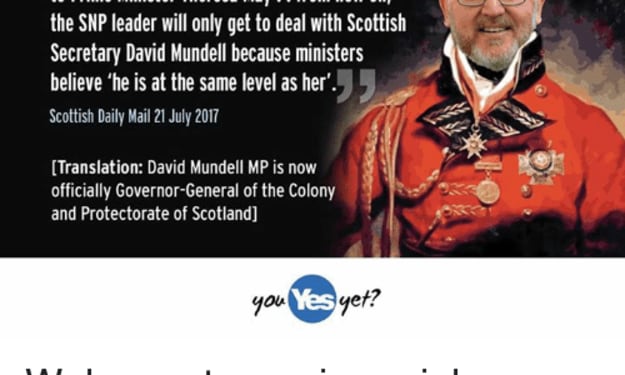Brexit and Cambridge Analytica Could Cost Scotland Independence
And Not for the Reasons You Think

Distrust of Politicians Hardens Attitudes
Hardly anyone under 60 trusts politicians or the mainstream media anymore, thus leaving them open to populist manipulation—for example using the techniques used by Cambridge Analytica, with its top Tory dominated board, in the EU referendum to confirm their biases and make them impervious to argument.
This could mean that YES voters who want to leave the EU could be persuaded to vote NO and so that they can more easily obtain independence after Brexit.
Politicians lie: It's a law of nature.
Today many people adopt simple rules for dealing with political statements:
- Anything a Tory/Labour/Liberal/UKIP/SNP politician proposes is bad for Scotland and indeed the United Kingdom.
- Anything a Tory/Labour/Liberal/UKIP/SNP politician says is a lie until independent evidence arises to show that they have discovered a fact that can be weaponised without distortion.
Since most politicians lie as a Pavlovian reflex, and an electorate continually dumbed down since Labour screwed up the introduction of comprehensive education seeks simplicity rather than understanding, comforting lies rather than cognitively dissonant truths, and would collectively rather die than think, the probability of a mainstream politician telling the truth—which as Oscar Wilde put it, is never plain or simple—is rather less than the probability of putting the kettle on and having the water in it freeze.
Fact checking shows some parties lie more than others.
How does the intuitive view that the Tories are the biggest liars in Scottish politics bear up to reality?
A year of fact checking by the Ferret showed that, in Scotland, the SNP were the least untruthful of all parties and the Conservatives the most untruthful. Simply listening to English news with a critical mind indicates English Tories to be equally untruthful, the holes in their accusation of Russia in the recent failed attempt to poison a retired and pardoned ex Russian spy being merely the latest indication of their stunning laxity with the truth.
Based on recent history, there is a 47 percent chance a Scottish Conservative political statement is false or unbelievable (rated FFS, reserved by the Ferret for claims that are “baseless, ridiculous and/or logically impossible!”) and a 23 percent chance it is mostly false, giving a 70 percent chance a Conservative party statement is reliable only as a guide to what is not true. Neither Labour nor the SNP gained any FFS ratings.
For Labour, surprisingly, there is a 15 percent chance a claim is false and a 5 percent chance that it is mostly false giving a 20 percent chance their statements can be dismissed out of hand while there is a 20 percent chance their statements are half true. This suggests they are far more reliable than the Conservatives
For the SNP, however, there is a 36 percent chance their statements are true and a 37 percent chance they are mostly true, meaning a 73 percent chance that their statements can be accepted with minimal fact checking.
Why Some Lie and Why Some Don’t
The Conservatives are in power in the UK and believe they will stay in power. They feel no need to tell the truth, even if they know what it is, and that they can say whatever they think will help them in their personal quest for power and money while the public will accept whatever they say fed to them by a compliant mainstream media. This also explains why the Tories have made more U-turns than a ceiling fan.
Scottish Labour are further from power but include a large percentage of Red Tories who also feel they can say whatever they like but may feel a politically unprofessional dislike of outright lying and fantasy and, given the poisoned chalice of Brexit, would rather remain in opposition.
Given the electorate’s love of comforting lies, the success of the SNP, if only in Scotland, despite largely telling the truth, is a mystery for future researchers to solve.
How This Could Cost Scotland Independence
Reading various social media forums, not all echo chambers, distrust of politicians seems to be becoming more widespread. There is also a widespread distrust of the mainstream media by those with access to alternative information sources—generally speaking, this means the under 60s and the better educated. In Scotland, this is fuelled by observations of perceived deliberate media bias against Scottish Independence.
Brexit has divided Britain, including Scotland, and will continue to do so for at least a generation. If Britain leaves the EU, a counter UKIP will arise to campaign for reentry and if Brexit is cancelled the Brexiteers, especially those who lose money as a result of the forthcoming EU clampdown on Tax havens, will fight for another exit referendum: expect to see pictures of Nigel Farage everywhere 24 hours a day.
Distrust of politicians and the media will harden the attitudes of the soft NO voters and leave Soft-Yes voters who think leaving the EU is more important than independence, by making them impervious to facts contradicting their present opinion.
Somehow the YES movement must establish itself and the SNP as more trustworthy than its opponents and get its message out to the public.
Brexit has not yet boosted support for Independence and the widespread distrust of Westminster’s self selected political elites and Scottish lapdogs in the Unionist parties makes it seem as if this will not change, as people become hardened in their attitudes without access to trusted and trustworthy sources of information and, having been dumbed down by a deliberately failed education system, collectively lack the ability to evaluate information critically.
Sources
https://theferret.scot/ferret-fact-service-fact-checking-numbers/





Comments
There are no comments for this story
Be the first to respond and start the conversation.